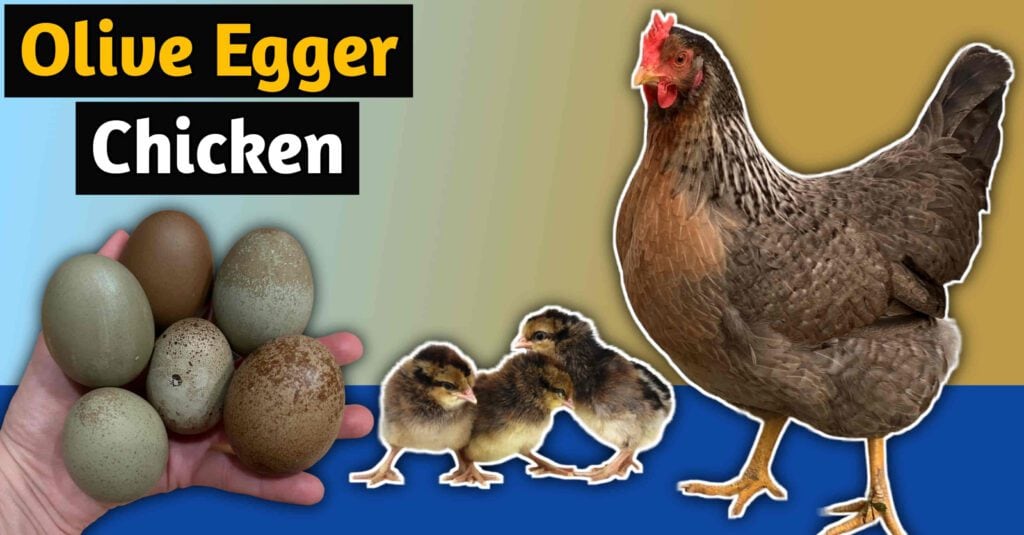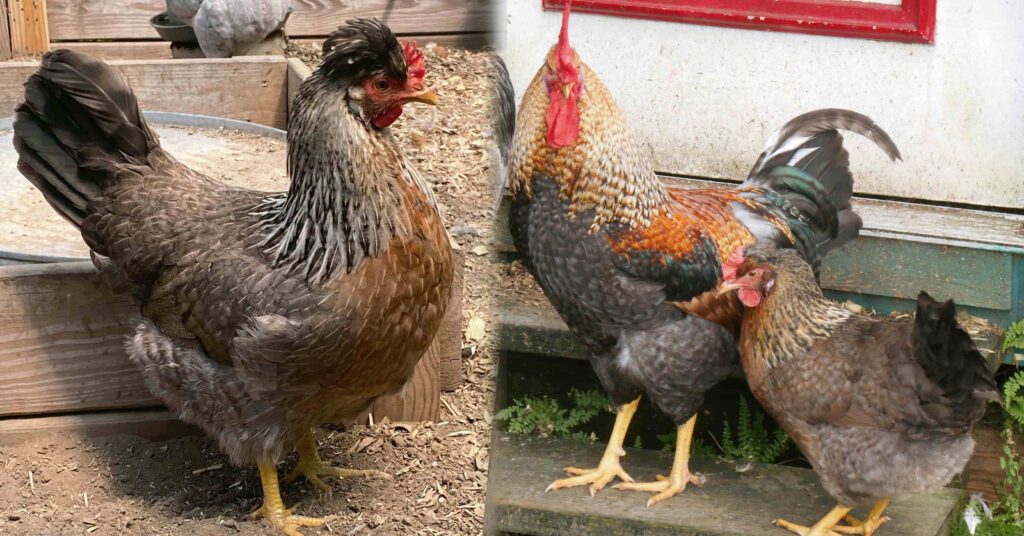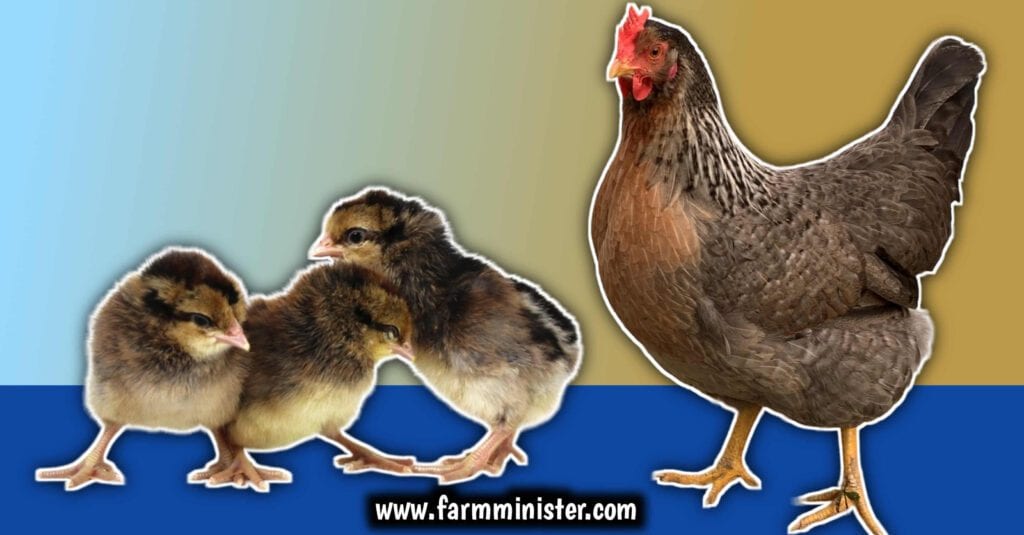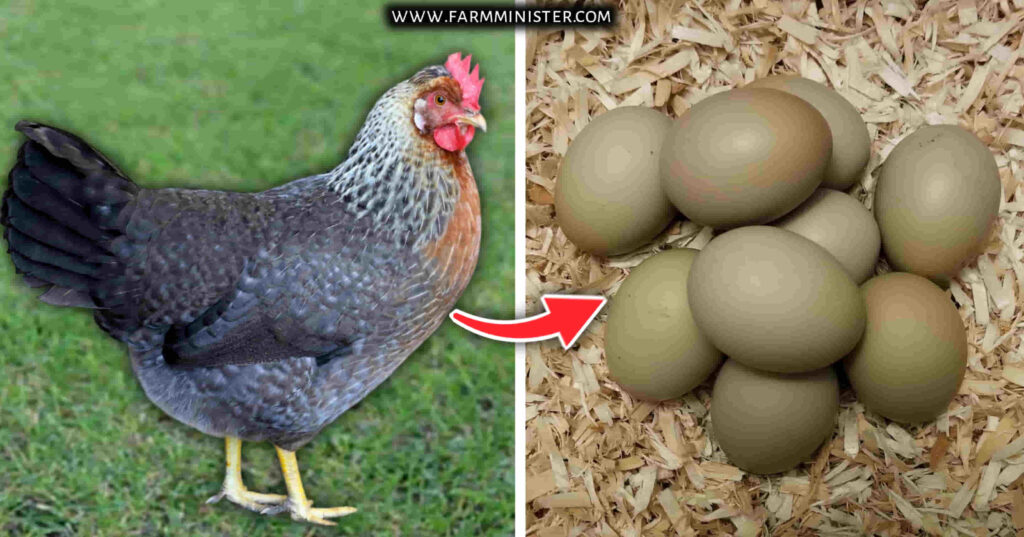If you are a chicken lover and looking for adding some uniqueness into your backyard chicken flock! Look no further than the Olive Egger chicken breed. In this blog post, we’ll explain in details about the Olive Eggers, as well as their care, feeding and other important requirements.

Olive Egger Chicken Breed?
Olive Egger chicken breed is a hybrid chicken that produce unique color (olive-colored) of eggs shells. This crossbreed chicken is created by crossing dark brown egg-laying breeds like Marans or Welsummer with blue egg-laying breeds such as Ameraucana or Araucana to create Olive Eggers.
1) Origin:
The Olive Egger is relatively a new breed of chicken, that was created in the United States in the 1970s. The result of chickens laying eggs with a greenish or olive-colored shell, due to the combination of genes inherited from their parent breeds.
While the exact origins of the Olive Egger chicken breed is unclear, because many breeders are there who have claimed to have created the breed themselves. However, the breed has gained popularity in recent years due to their unique color of eggs and their charming personalities.
Also Read: Olive Egger Vs Whiting True Green Chicken
2) Physical characteristics:

Physical characteristics of Olive Egger Chickens can vary widely, as they are not a standardized breed. However, there are some common features which can observed in Olive Egger chickens is;
- Size: Olive Eggers are generally medium in sized, with a moderate body weight. They don’t get heavy as like other breeds of chicken
- Feather Colors and Patterns: Olive Eggers can display a wide variety of feather colors and patterns. You may find Olive Eggers with black, brown, red, buff and various shades of gray.
- Comb Type: The comb type of Olive Eggers can also vary, some may have a single comb, others may have a pea comb.
- Facial Features: Olive Eggers may have a beard or muffs around their faces.
- Earlobe Color: The earlobes of Olive Eggers are typically red or white.
- Leg Color: The leg color of Olive Eggers can vary between breeds. Some may have yellow legs, while others may have slate or greenish-gray legs.
Read Also: Olive Egger Rooster Vs Hen
3) Temperament:
Olive Egger chicken breed is known for their friendly and polite personalities. They are good with their owner and their children’s, their calm nature makes them a good pet. As like most chickens, Olive Eggers are also social and they love to live in flocks. They can cooperate very well with other chickens in backyard flock.
Also Read: Olive Egger Vs Ameraucana Chicken
4) How much dose a Olive Egger chicken chicks cost?

The cost of Olive Egger chicken chicks can vary or depending on several factors, such as the breeder, location, seasons and the demand for the breed. On average, the price range for Olive Egger chicks can be anywhere between $5 to $15 per chick.
5) What do Olive Egger chicken feed?
Olive Egger chickens have similar dietary requirements to other chicken breeds. They need a balanced diet that includes all the essential nutrients for their better growth and development. Here are some food options that you can add to olive egger chickens diet:
Read: 9 Best Free Natural Chicken Food Option
I) Commercial Chicken Feed:
The commercial chicken feeds usually contain the necessary and balance of nutrients, including, protein, vitamins, and other important minerals that required for optimal health of chickens and higher egg production.
II) Kitchen Scraps:
Olive Eggers can also benefit from kitchen scraps, such as vegetable peels, fruit scraps, bread crumbs and other kitchen waste. However, it’s important to avoid feeding them toxic or spoiled foods as well as anything that is high in salts or sugars.
III) Forage:
Let your chickens to roam outside where they can find bugs, worms, grass and other natural sources of food which are highly beneficial for them. Foraging not only supplements their diet with additional nutrients but also helps to keep them mentally and physically stimulated.
IV) Grit and Calcium:
Offer your chickens grit and calcium on regular basis, which consists of small stones or oyster shells. Grit helps the chickens grind their food in their gizzard, and calcium is vital for eggshell and bone formation, so providing a source of calcium, such as crushed oyster shells or other calcium supplements.
Read Also: Olive Egger Vs Easter Egger
6) size of Olive Egger Chicken
Olive Egger chickens are basically found medium to large in sized, if we talk about the weight of adult Olive Egger hens then it ranges from 5 to 7 pounds (2.3 to 3.2 kilograms), while roosters are little heavier, weighing around 6 to 8 pounds (2.7 to 3.6 kilograms).
7) When do Olive Egger chicken start laying eggs?
The age at which Olive Egger chickens start laying eggs can vary. However, Olive Eggers start laying eggs between the ages of 5 and 6 months. The timing of their egg laying can depend on several factors, such as nutrition, health, and daylight hours.
8) Egg Production:

Olive Egger chicken breed hens are good layers, hen can lay on an average of 3-4 eggs per week, and about 140 to 200 eggs per year. It’s important to note that the size of the first eggs they produced may be smaller, as the hen matures, their egg production will increase and become more consistent.
9) Olive Egger Chicken Egg Color
The most attractive feature of Olive Egger chicken breed is the unique color of their eggs. Olive Egger hens are lay eggs with a greenish or olive-colored shell, which makes them different from most of the other chicken breeds.
10) How long do Olive Egger chicken lay eggs?
Olive Egger chickens are known for being excellent layers, as they can lay eggs continue for 3-4 years old or even older. The peak egg-laying period for Olive Eggers is typically during their first two to three years of production.
However, their egg production may gradually decrease as the year passes. It’s also important to note that the hens may naturally slow down the eggs production or stop laying eggs under the stressful or abnormal conditions.
11) How long do Olive Egger hens live?
The lifespan of Olive Egger hens can vary depending on several factors, on average, Olive Egger hens can live between 6 and 8 years. However, some hens may live longer, while some others may have a shorter lifespan.
12) Is Olive Egger chicken good for meat?
Olive Egger chicken breed is primarily known for their egg-laying capabilities rather than their suitability for meat production. While Olive Egger chickens can be consumed as meat, but they are not typically raised for meat production.
If you are looking to raise chickens primarily for meat purpose, then there are many others chicken breed to chose, that may be better and suited for meat purpose, because their body weight become haviour and grow faster than the olive egger chickens.
13) Are Olive Egger chicken is good for beginners?
Olive Egger chickens can be a good choice for beginners, because of their Hardy and Adaptable, Docile Temperament, Good Egg Production, easy to care etc. makes them better choice for the beginners.
Conclusion
In conclusion, Olive Egger chicken breed is a good and unique breed that offers many advantages for both beginner and experienced chicken keepers. As you can learn the basic things about chicken farming by keeping this chicken breed, further which will help you to become a successful chicken keeper.
FAQs
Q1: Are Olive Egger chickens good egg layers?
Ans: Yes, olive egger chickens are a good layer for backyard chicken keeper, but not good for people who are looking for commercial egg production.
Q2: What color eggs do Olive Egger chickens lay?
Ans: Olive eggers are lay Olive Green color of eggs
Q3: At what age do Olive Eggers start laying eggs?
Ans: Olive egger chickens are start laying eggs when they become 140-150 days (5 months) old.
Q4: Are Olive Eggers cold hardy?
Ans: Yes, olive eggers are cold hardy, these chickens can easy survive in cold climatic conditions.